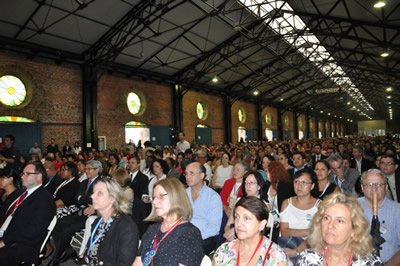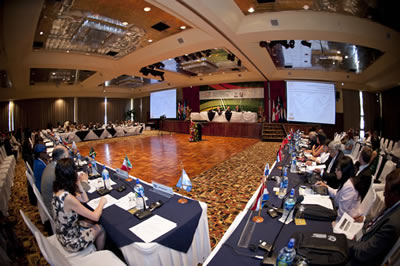The Regional Agenda on Equality Requires the Inclusion of Older Persons in Social Protection Systems
The number of older persons in Latin America will exceed that of children in 2036.

Watch live transmission of the conference
(9 May 2012) The decreasing child population and the increasing number of older persons makes it imperative to redesign the way the State, the family and the market ensure welfare and capacity development of the population in Latin America and the Caribbean, as stated in a study published today by ECLAC.
The document Ageing, Solidarity and Social Protection: Time to Move Towards Equality analyzes prospects on population ageing and its inclusion in the public agenda, based on ECLAC's development proposal entitled "Time for Equality".
The report is central to the debates taking place during the Third Regional Intergovernmental Conference on Ageing in Latin America and the Caribbean, being held from 8-11 May in San Jose, Costa Rica, organized by the Government of the country and ECLAC.
The conference was inaugurated last Tuesday by the President of Costa Rica Laura Chinchilla, who stressed the importance for countries of the region to have an agenda on the protection of older persons.
"Through this conference, we are not only honoring the legacy of older persons but also working for the future of our region. The moment to be farsighted, the moment to be socially committed, the moment to do things right is now," said President Chinchilla.
Hugo Beteta, Director of ECLAC's Subregional Headquarters in Mexico, addressed the major demographic change that the region is experiencing, which denotes a new era. "It is paramount to pay more attention to older persons, to their concerns and needs, as well as to the contributions that they can make and must continue to make to our societies," he said.
Beteta also recognized Costa Rica's President's contribution, who personally incorporated social services into the national social protection and ageing agenda. "Your promoting an old persons care network in Costa Rica, by means of the National Council of Older Persons (CONAPAM) in the last two years, has been key for considering this new need a priority issue for public policies in your country," he noted.
The United Nations Population Fund (UNFPA) Regional Director for Latin America and the Caribbean Marcela Suazo said "the governments of the region face the urgent challenge of implementing gradual and efficient reforms to health and education systems, to employment policies, as well as social security systems and non-contributory pensions."
According to the ECLAC document presented today at the conference, it is necessary to reconsider social protection so that it responds immediately to demographic transformations and their impact.
The study, drafted by the Latin American and Caribbean Demographic Centre (CELADE) - ECLAC's Population Division - adds that older persons should not and can not be excluded from the equality agenda promoted in the region - not only because their relative relevance in the population is rapidly increasing, but also for "satisfying the huge ambition of inclusion and of building more democratic and pluralistic societies".
According to the document, by year 2070, the number of older persons in the region will have increased fourfold. Prospects show that the number of older persons will exceed - for the first time - that of children by year 2036. The group of people over the age of 60 increased from 5.6% of the region's total population in 1950 to 10% in 2010 and it is expected to reach 21% in 2040 and 33% in 2070.
In this report, ECLAC indicates that it is necessary to eliminate the traditional approach to ageing as a problem and to consider it rather an opportunity emerging from the concerted and effective action of public authorities and citizens.
At a regional level, public spending on social security and assistance has increased significantly in the last two decades; nevertheless, only four out of ten Latin Americans over the age of 65 (40%) were receiving pensions or superannuation in 2009, whereas in developed countries this figure accounted for 75% of the population.
The document highlights that reducing inequality in old age is not exclusively linked to superannuation and contributory pensions. For this reason, ECLAC proposes the introduction of a solidarity-based pillar. It also addresses the demand for health care, and the care burden derived from an increasingly ageing population.
Finally, the report takes stock of the progress made on the implementation of the Madrid International Plan of Action on Ageing (2002) and the Brasilia Declaration, adopted in 2007 at the Second Regional Intergovernmental Conference on Ageing. This progress includes an increase in the number of countries intending to eliminate age discrimination at work, a better access to social security by means of non-contributory pension programmes for older persons, and their progressive inclusion in health plans and programmes, among others.
See also:
The media are invited to attend the Conference, which is taking place at Hotel Barceló San José Palacio (Residencial El Robledal, La Uruca 4581150 San Jose, Costa Rica)
More information - including the full event agenda - is available on ECLAC's website.
For further questions, please contact ECLAC's Public Information and Web Services Unit: dpisantiago@cepal.org ; Tel.: (56 2) 210 2040.
Follow us on Twitter, Facebook, Flickr and YouTube.
Related content

Countries of Latin America and the Caribbean Commit to Promoting the Human Rights and Freedoms of Older Persons
The San José Charter was adopted by the representatives of the ECLAC member States.
Country(ies)
- Latin America and the Caribbean
-
Costa Rica
Related project(s)
Contact
Public Information Unit
- prensa@cepal.org
- (56 2) 2210 2040